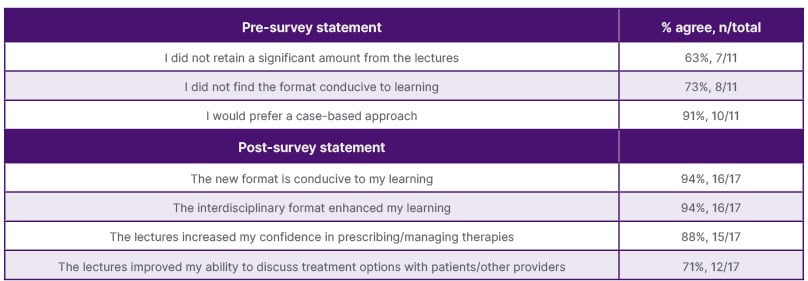BACKGROUND
Thorough understanding of cancer therapeutics is a critical component of hematology–oncology (HO) training, with pharmacology forming a core component of the American Society of Clinical Oncology/European Society for Medical Oncology (ASCO/ESMO) recommendations for a global medical oncology curriculum. Traditional didactic methods, while common, have been associated with variable satisfaction and limited engagement.1 Recent evidence, including a network meta-analysis of over 21,000 students, demonstrates that active learning strategies, particularly case-based and team-based learning, significantly improve theoretical knowledge, satisfaction, and clinical application in pharmacology education.2-4 Interdisciplinary and interprofessional modules further enhance confidence in medication management and collaborative skills.5 The authors created and implemented a novel pharmacology curriculum in their HO fellowship program using a case-based, interdisciplinary format grounded in principles of learning science.
METHODS
The authors used a pre–post design to evaluate and transform the pharmacology training within the HO fellowship program. The pre-existing curriculum, which was organized by drug mechanism of action and delivered via pharmacist-led didactics, was replaced with interactive sessions jointly led by pharmacists and clinicians. These new sessions were organized by disease-type and incorporated real-world cases, including treatment decision making, dosing considerations, patient counseling, and toxicity management, as well as multidisciplinary perspectives. Fellows completed pre- and post-intervention surveys assessing satisfaction, perceived knowledge, and confidence.
RESULTS
Thirty-four percentage of HO fellows filled out the initial survey (11/32), and 17 fellows (53%) completed the post-lecture survey, with results summarized in Table 1. Among the 12 respondents who had attended pharmacology lectures the previous year, there was a 100% perception of significant improvement with the new format. Thematic qualitative analysis emphasized increased absorption of material, increased clinical relevance due to clinician inclusion and case-based format, and general marked improvement. The following are examples of comments from the fellows:
“The inclusion of clinicians and use of case-based learning has greatly enhanced clinical relevance and absorption of material”, and “There is still important ‘at home’ work… but this is a much more digestible way to learn.”

Table 1: Pre- and post-intervention survey results.
CONCLUSION
HO fellows found a case-based, interdisciplinary, disease-specific pharmacology curriculum conducive to learning and retaining information, and significantly more effective than a passive lecture series organized by drug mechanism of action. This is in line with recent multicenter studies reporting that case-based and active learning formats yield higher satisfaction scores and improved test performance.2,6,7 Fellows also perceive structured, relevant, and interactive curricula as superior to traditional formats, with measurable improvements in knowledge and satisfaction.6,8 The new format increased fellows’ confidence and abilities in managing cancer-directed therapies, and improved perceived skills related to interdisciplinary patient care.9 This curriculum could serve as a model for implementation at HO fellowship programs at other institutions.







